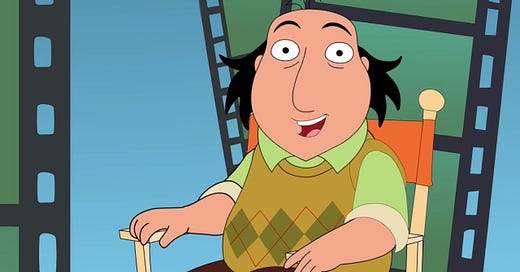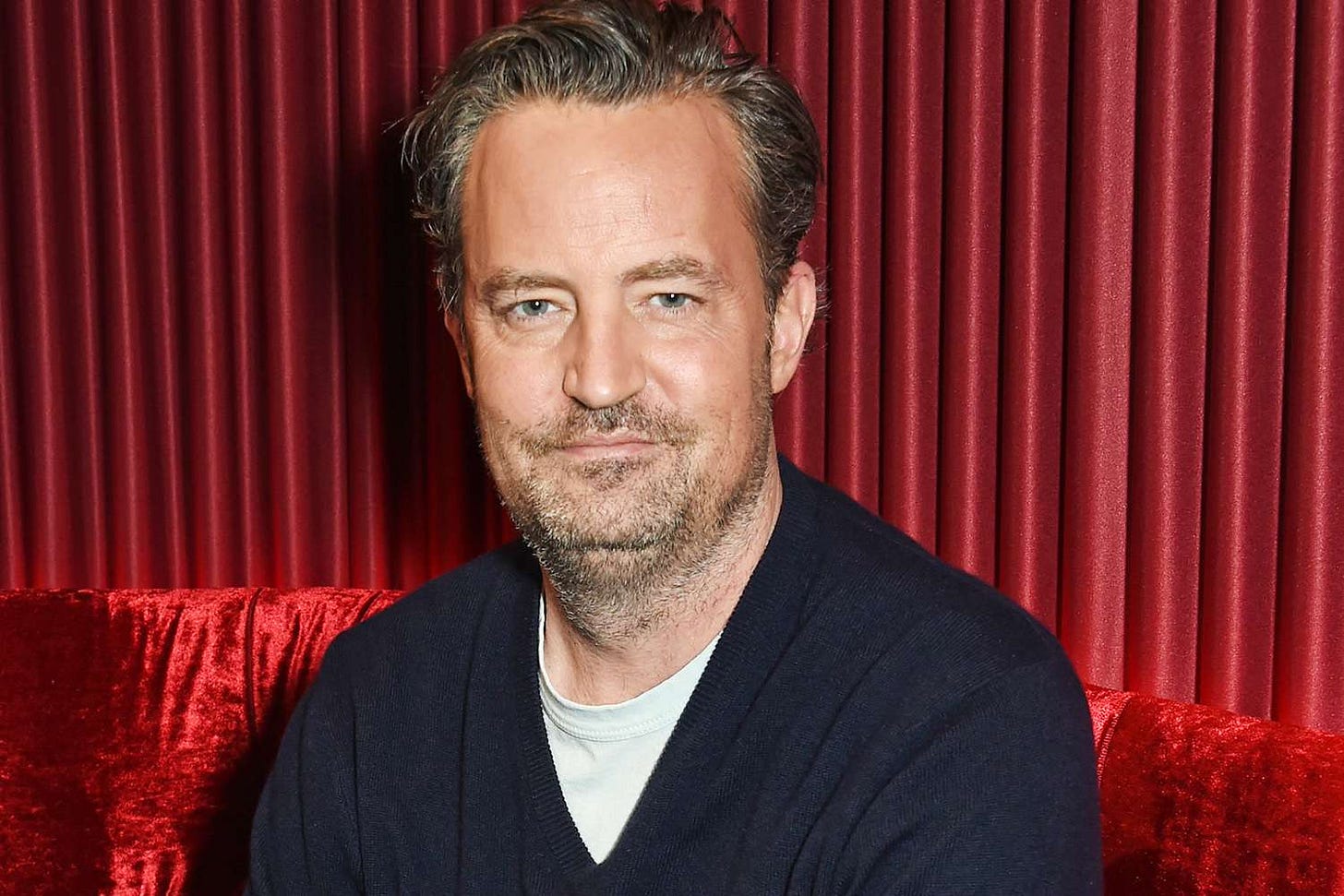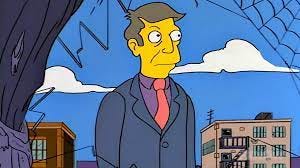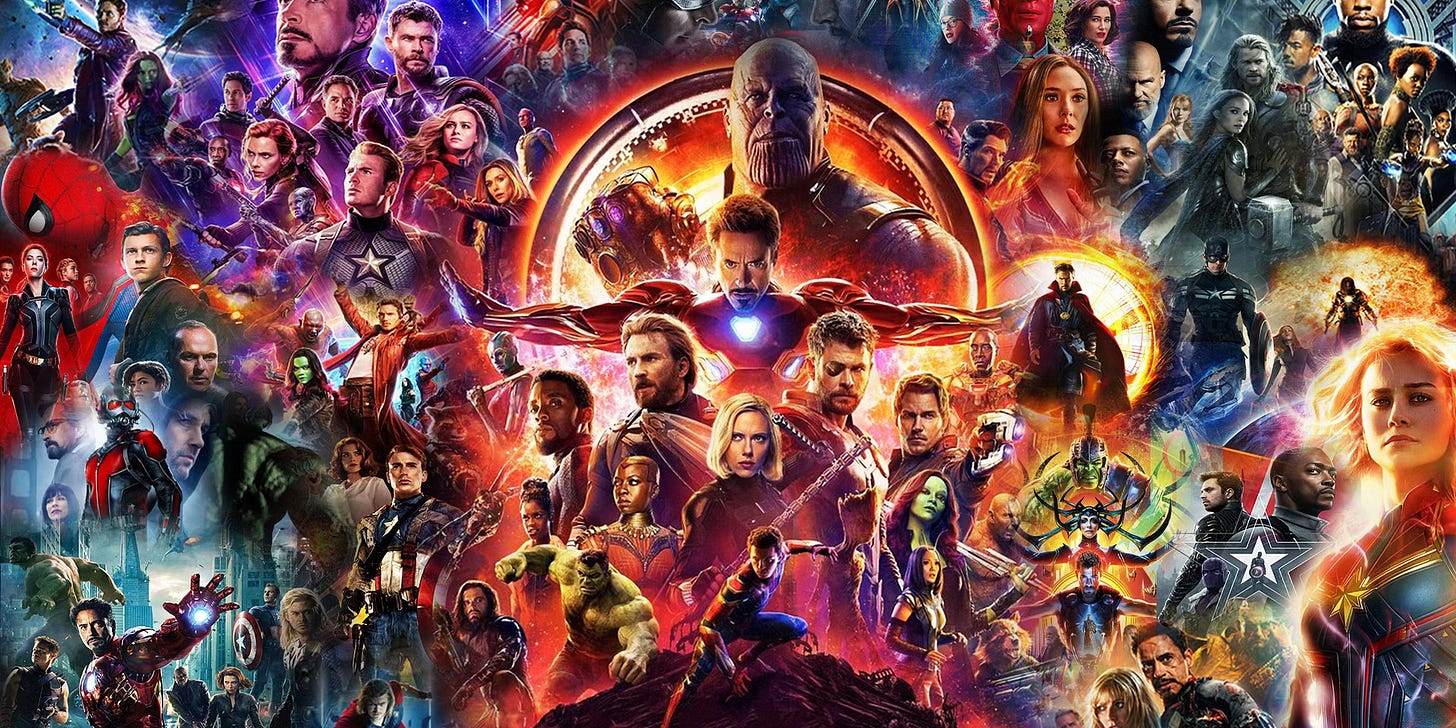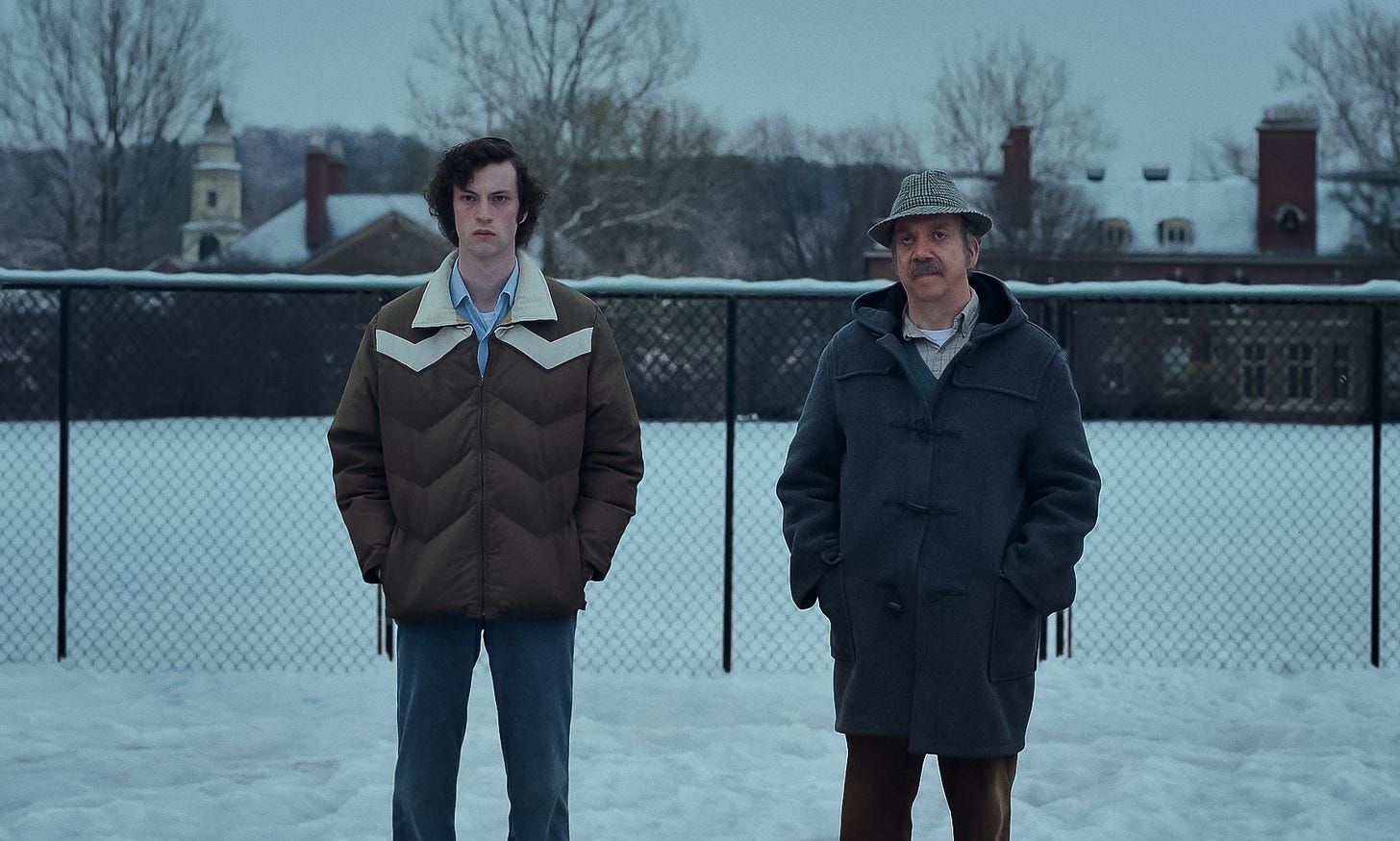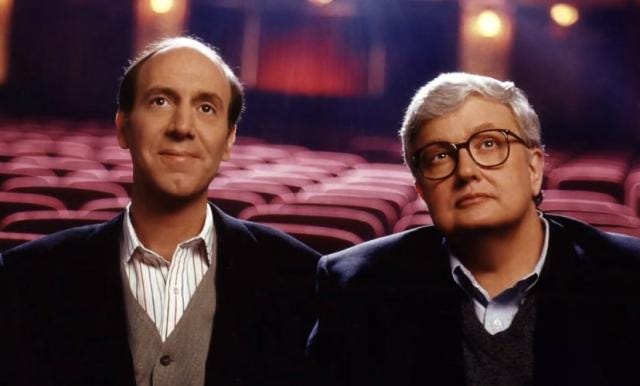Critic bits: Matthew Perry, Siskel and Ebert, and the November onslaught
Welcome to the busiest time of the year for critics
Happy Friday everyone.
I hope you all had an enjoyable Halloween. Ours was pretty great. We had chili and drinks with our neighbors. Our kids received a surprising number of full-size candy bars. There was a random dude stalking around our neighborhood without kids or friends wearing a full Michael Myers getup. And while the first snow hit in Michigan, it made it that much cooler when we hit a house where a guy who looked just like Santa (I don’t think he was in costume) welcomed us with cups of spiced wine.
Thank you also for taking the time to read all the horror-centric writing I did over the past month. I really enjoyed this year’s Stephen King series (read the final installment, which contains a list of all the previous ones). And while I once again bit off more than I could chew and didn’t get around to half of what I’d planned, I still think it was a good month for writing. And now we’re about to move into the final months of the year, and my favorite time for movies.
This week, I’m going to tackle a few topics that have been on my mind, something I want to try to do a bit more frequently. And at the end, I’ll reveal what we have in store for December.
RIP, Matthew Perry
Like many of you, I was shocked and saddened by the death of Matthew Perry at age 54 last weekend. It’s a celebrity death that has hit me fairly hard.
I was a teenager when Friends premiered, and I was just about to turn 25 when it ended. As was the case with most people my age, I was a fan of the show, which started as a look at what I hoped my twenties would be like and then became a show about that time in my life as I lived it. I was always more of a Seinfeld fan than a Friends one, but it was still one of my favorites, and a big part of that was due to the actors who created those beloved characters.
And, to me, it was always just an accepted truth that Chandler was the best of the friends. He was the funniest, but he was also the one who the writers seemed to provide with the most depth. He was a bitter cynic with family issues who slowly softened over the course of the show. As an insecure cynic who uses humor as a defense mechanism, it’s probably not surprising that he was the character I gravitated toward and felt the most kinship with. When my roommate and I referred to ourselves as “Joey and Chandler,” there was no question about who was who. I think that’s why Perry’s death hits so hard; he was a character many people not only deeply identified with but rooted for; Dan Fienberg said it really well in his piece at the Hollywood Reporter
I will admit to not following Perry’s career super closely outside of Friends, but I caught a little bit of it. He had a knack for delivering Aaron Sorkin dialogue; he was a frequent guest star on The West Wing, and although I didn’t much care for Studio 60 on the Sunset Strip after its phenomenal pilot, I did enjoy Perry’s performance. I also liked his work in the briefly lived Go On, a show about grief and friendship that deserved a bit more love from audiences.
It’s probably not surprising that the Friends cast struggled to break out of the shadow of their iconic series – when you are part of an ensemble that good, it’s hard to find your own path. Sure, Jennifer Aniston went on to become a big star and Courtney Cox is the center of one of our biggest horror franchises, but no one else’s career really floored it into superstardom. But Perry seemed to struggle the most, probably because his brand of humor depends on having a strong ensemble to bounce off of. I also know he had his demons, which he wrote about at length in his memoir. He struggled, but in recent years seemed to find some peace, and I hope that he was able to hold onto that peace. He was a talent I wish we’d had more time with.
‘Five Nights at Freddy’s’: It’s the children who are wrong
Few movies have made me feel as out of touch as Five Nights at Freddy’s. I thought that when our audience cheered at the appearance of YouTubers, and I thought it again when the movie made nearly $80 million this past weekend – despite also being able to view on Peacock (is it proof of the movie’s popularity, or just proof that no one has Peacock?).
As I wrote earlier this week, I wasn’t the biggest fan of Five Nights at Freddy’s. My son, who’s 11, is. I came home from work one day to find him watching it for a second or third time on Peacock. He loves it. And I’ve several people, including critics, just shrug and say “well, it’s not for us. It’s for the kids.”
That might be true. But I’m still baffled as to why kids like this for any reason beyond recognizable IP. It takes an admittedly good idea and manages to remove any suspense or real scares from it, and spends way too much time focused on Josh Hutcherson’s character doing dream therapy and battling mean family members. This would seem to be a fairly easy concept to get right – take a bunch of people, lock them in Freddy Fazbear’s and let the robots run loose. This adaptation seems to think it has to prove itself a “real” and “serious” ghost story (but, you know, with robot animals run amok), and it’s all the worse for taking itself too seriously. Sorry, kids: in this one, you’re wrong. But coming from a generation that helped Problem Child earn more than $70 million, I can say that it happens to us all.
But with that gross – tripling its budget in the course of a weekend – we’re pretty much guaranteed a Five Nights at Freddy’s sequel. And I hope that when audiences return for another slice, there’s a bit more of a sense of fun awaiting us at Freddy Fazbear’s.
Is the MCU dying?
There’s a lot going on right now in the movie sphere regarding the Marvel Cinematic Universe and its potential death. The latest news is an excellent report in Variety about the troubles that plagued The Marvels, Ant-Man and the Wasp: Quantumania and anything regarding Jonathan Majors’ Kang. I highly recommend the read.
I think it’s a little premature to count Marvel out just yet. After all, the comics titan was on its last legs before, just before the MCU revived it. And if you read the fantastic new book MCU: The Reign of Marvel, you’ll learn that not only has the cinematic saga been counted out before, but Kevin Feige excels at righting things that once went wrong. Plus, whether every movie is a billion-dollar grosser or not, Marvel is still such a dominant part of both the cinematic and streaming landscapes that I’d argue it’s too big to fail.
But I can’t deny that fatigue is setting in. The Marvels releases next week and I have no definitive plans to see it (I’m out of town when they screen it for the press). I’ll probably take my kids to see it over opening weekend, but no one really feels too driven at this point, even though we all liked Captain Marvel. My wife and I loved season 1 of Loki, but we haven’t cared enough to hit play on Season 2 yet. It all feels just a bit too much, too obligatory these days, and the return on our investment doesn’t feel as great as it did in the ten-year span leading up to Avengers: Endgame.
The Variety article suggests a few fixes, such as controlling budgets and slowing down the flow of content, both of which I think are smart. I’m a little less enthralled about the rumors about bringing back Robert Downey Jr. and Scarlett Johansson; I’d rather they let the definitive ending of Endgame stick for those characters. For what it’s worth, I wrote up some things I thought could fix the studio earlier this year, and I think they still stand.
And here’s the thing: Despite its flaws and the toxic fandom around it, I don’t want the MCU to fail. That stretch of 20 films was some of the most fun I’ve ever had at a theater, and going to see the latest release has been a fun bonding experience with my son. I don’t buy the logic that just because it’s not serious it’s not worthwhile; there’s something to say for escapism, and I’ll be thrilled if Feige and the rest of his team can turn this ship around. But right now, it’s absolutely in a perilous spot.
Alexander Payne delivers the feels
I wish I could link to my review of Alexander Payne’s The Holdovers over at CinemaNerdz right now, but the marketing team made the weird decision to ask local critics to hold their reviews until opening day. It’s a move that makes zero sense to me. Payne’s latest was released at several film festivals, where critics wrote their reviews after screening it and the studio has held paid sneak peeks over the last few weeks, so several general audiences have also seen it. Plus, the film is getting mostly very positive reviews. So, who knows what’s up. There’s also the huge frustration about critics having to serve at the whims of marketers, but that’s a rant for another day.
I’m writing this post before that Nov. 3 date, so I can’t link to the review yet – but you’ll be reading this on Nov. 3, so I can at least say a bit here. But I would encourage you to head over to CinemaNerdz this weekend and read the review, which I’ll also link to on my social feeds and put up in my Substack notes. I tend to run fairly hot and cold on Payne. I think Election is a contender for the best film of 1999, but his run after has been scattered. I’m not as high on Sideways as many other critics, although I’ll admit it’s probably overdue for a revisit. I think Downsizing is abysmal. And there’s stuff I like in About Schmidt, The Descendants and Nebraska, but they’re also films I don’t think about much.
But The Holdovers is special. It’s much warmer than what Payne usually delivers, and it features a great performance not only by the always reliable Paul Giamatti but also newcomer Dominic Sessa. It’s a warm-hearted movie about prickly people, but this is the first time in awhile where I think Payne actually likes his characters and is actively rooting for them. And I love its aesthetic, so reminiscent of the films we regularly got in the 1970s and 80s. The crowd I saw this with loved it, crying and laughing in all the right places; it’s a great crowd movie, if only because the experience of laughing together in a theater is so rare these days. Plus, it gains a lot from its Christmatime setting; if the right people see this and keep going, I could see this turning into a holiday classic for many. Don’t miss this one; it’s one of the year’s best.
I’d give it two thumbs up if I could (but I can’t)
I can’t legally give Matt Singer’s new book Opposable Thumbs: How Siskel and Ebert Changed Movies Forever two thumbs up – Siskel and Ebert copyrighted that term and their estates could probably sue me (good luck; there’s no profit to be had on this site). Plus, I’m technically only halfway through the book. But if I could, I would. It’s one of the most entertaining and well-written books about movies of the year (and that’s saying something in a year where Quentin Tarantino wrote a book about movies).
Singer, a critic I’ve followed since his days writing for The Dissolve and co-hosting the Filmspotting spinoff podcast about streaming movies, obviously has deep affection for Siskel & Ebert, and he’s done his homework. The book looks at the history of the duo’s show, and delves deep into their rivalry, begrudging respect, pettiness and extracurricular activities (there’s an entire chapter devoted to their talk show appearances, and it’s a ton of fun to read). Singer’s an engaging writer, and you can tell he had just as much fun writing this book as we have reading it.
Oddly enough, I was never really a Siskel & Ebert fan. I was familiar with them by cultural osmosis, but I don’t know if I ever saw a full episode of their show. In Detroit, it aired on Sunday mornings, and we were a strict churchgoing family. It was actually well after Siskel’s death that I started reading Roger Ebert’s reviews online when I was in college, and I don’t think there’s a single writer who had as much influence on how I viewed and wrote about film. And a great companion piece for Singer’s book is Ebert’s Great Movies books, his memoir Life Itself and Steve James’ wonderful documentary about the film.
As you can tell, I went into this as more of an Ebert fan. But what’s so enjoyable about Opposable Thumbs is how it does treat the duo as a package deal. And I’ve loved learning about Siskel, his competitiveness and the pranks he pulled on Ebert. I still think my tastes, based on what I’ve read, align more with Ebert’s, but I respect how Siskel challenged him, and I’m glad he gets his due. I highly recommend this book.
Let’s talk Christmas Music
Just a brief digression from the movies. It’s now November, and I’m curious about reviving the old Christmas music debate. Growing up, my Dad was a stickler about not starting anything Christmas-y until Thanksgiving Day. No Christmas music. No holiday movies. No lights. No tree. Once Santa made his way down Woodward in America’s Thanksgiving Parade, though, he was a Christmas madman.
In recent years, he’s changed his course. I think because he plays in the church orchestra – which starts rehearsing Christmas numbers in October – he listens once Nov. 1 rolls around. And, after years of protest, I’ve started doing a bit as well. I’m a bit measured in how I do it. I can’t bring myself to listen to most of the standards – no “Jingle Bell Rock,” “Holly Jolly Christmas” or Mariah Carey until the week of Thanksgiving. And no movies or lights until the same time. But I’ve found myself playing some Christmas cocktail jazz or Over the Rhine’s sad Christmas songs during the early days of November.
After all, if the days are going to get shorter, you need something to cheer you up. And in the pandemic years, I definitely needed something to leaven the mood – and it’s just kind of stuck around. I can’t go whole hog yet, and I’m still listening to my regular rotation and only filtering in some minor Christmas music. But there’s so much good holiday stuff around, why limit it to 30 days?
I’m curious if anyone else does the same thing.
It’s November – buckle up
And, building on what I said above, it’s November. And we’re entering the busiest 30-day stretch in the year for critics. By Dec. 1, I have to have submitted my votes for the year’s best films and performances for my local critics guild, and there’s still a lot to catch up. We have two screening days set for the end of the month, but I’m getting a bit nervous about the fact that the studio screeners don’t seem to be as plentiful as they were in past years.
But, we’re going to do what we can. And that means so much time will be spent watching movies over the next few weeks that the writing will probably take on a weird rhythm. You’ll probably get more thoughts on new movies than usual, but I haven’t quite figured out how I’m going to handle that yet. Either I’ll group a few together in a weekly email or I’ll write shorter reviews and do individual messages for each one. We’ll see how it goes.
Thankfully, I’m doing a lot of traveling through November, which means a lot of nights in a hotel room with nothing to do but catch up on movies. So buckle up; it’s about to get busy.


